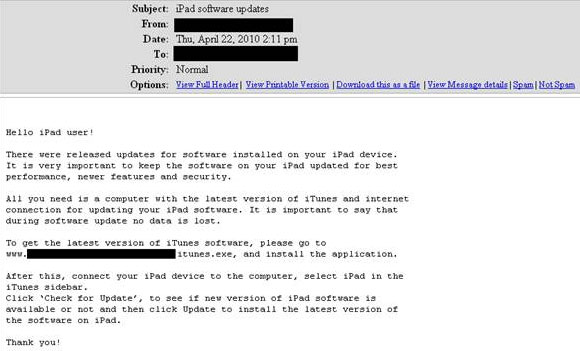iPad users targeted by backdoor dissembled as iTunes update
May 2010
IT in Manufacturing
An e-mail invitation to an iTunes update gets iPad users’ PCs into backdoor trouble.
Success stories are cybercriminals’ go to sources of victims and the iPad craze could not have been left out of this picture. According to some reports, Apple sold 150 000 iPads in the first 60 hours of presale availability, with almost 100 000 of these coveted devices being pre-ordered in the first 10 hours. The figures make it clear as daylight why malware creators were so keen on crashing this promising party.
The invitation to the 'contagious fiesta' comes via the e-mail: an unsolicited message instructs iPad users to download on their PCs the latest version of the iTunes software as a preliminary step to an update of their iPad software.
Figure 1. The fake iPad software update announcement
To carry conviction, the e-mail emphasises that users should keep their iPad software updated 'for best performance, newer features and security'.
It goes on to clarify the multistep procedure by pointing out that in order for the update to be performed the latest version of iTunes should first be downloaded from the Internet. A direct link to the download location is conveniently provided. As a proof of cybercrime finesse, the webpage the users are directed to is a perfect imitation of the one they would use for legitimate iTunes software downloads.
Unfortunately for these users, following the malicious link means opening up a direct line to their sensitive data as instead of the promised iTunes update they get malware on their systems.
Figure 2. The download that will turn the update into a nightmare
Identified by BitDefender as Backdoor.Bifrose.AADY, the piece of malicious code inadvertently downloaded injects itself in to the explorer.exe process and opens up a backdoor that allows unauthorised access to and control over the affected system.
Moreover, Backdoor.Bifrose.AADY attempts to read the keys and serial numbers of the various software installed on the affected computer, while also logging the passwords to the victim’s ICQ, Messenger, POP3 mail accounts, and protected storage.
It is important to say that Mac users remain unaffected by this piece of malware.
For more information contact Alina Anton, senior PR and marketing coordinator, EMEA & APAC Business Unit, BitDefender, +40 212 063 470, [email protected], www.bitdefender.com
Further reading:
Why choose between Capex and Opex if you can Totex?
Schneider Electric South Africa
IT in Manufacturing
In a sector marked by cyclical demand, high capital intensity, and increasing regulatory and sustainability pressures, mining, minerals and metals (MMM) companies are re-evaluating how they approach procurement and investment.
Read more...
AI and the smart factory
Schneider Electric South Africa
IT in Manufacturing
Imagine walking into a factory where machines can think ahead, predict problems before they happen and automatically make adjustments to realise peak performance. This isn’t science fiction, it’s happening right now as AI continues to transform how we run industrial operations.
Read more...
Why your supply chain should be a competitive advantage
Schneider Electric South Africa
IT in Manufacturing
The last five years have placed unprecedented strain on global supply chains. Leading companies are turning the challenge into an opportunity to transform their supply chains into a competitive advantage.
Read more...
Why AI will never truly understand machines
Wearcheck
IT in Manufacturing
Cutting-edge technology and solutions powered by AI are embraced by specialist condition monitoring company, WearCheck, where the extreme accuracy of data used to assess and diagnose machine health is paramount.
Read more...
Buildings and microgrids for a greener future
Schneider Electric South Africa
IT in Manufacturing
Buildings are no longer passive consumers of power. Structures of almost every size are evolving into dynamic energy ecosystems capable of generating, storing and distributing their own electricity. Forming part of this exciting transformation are microgrids.
Read more...
Traditional data centres are not fit for purpose
IT in Manufacturing
Traditional data centre designs are falling short, with nearly half of IT leaders admitting their current infrastructure does not support energy or carbon-reduction goals. New research commissioned by Lenovo reveals that data centre design must evolve to future-proof businesses.
Read more...
AI agents for digital environment management in SA
IT in Manufacturing
The conversation about artificial intelligence in South Africa has shifted rapidly over the past year. Among the technologies changing the pace of business are AI agents - autonomous, task-driven systems designed to operate with limited human input.
Read more...
AI-powered maintenance in future-ready data centres
Schneider Electric South Africa
IT in Manufacturing
The data centre marketplace often still relies on outdated maintenance methods to manage mission-critical equipment. Condition-Based Maintenance (CBM) is powered by AI and is fast becoming a necessity in ensuring both competitiveness and resilience.
Read more...
Powering up data centre mega development
IT in Manufacturing
Parker Hannifin has secured a major contract to supply key equipment for nearly 30 aeroderivative gas turbines powering a new hyperscale data centre in Texas.
Read more...
Building resilient supply chains through smarter e-procurement
RS South Africa
IT in Manufacturing
In a time of constant disruption, from supply chain uncertainty to rising operational costs, businesses that embrace digital procurement are better positioned to stay competitive and resilient.
Read more...



